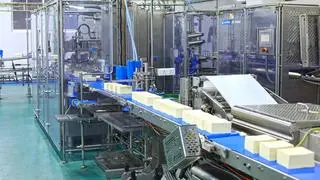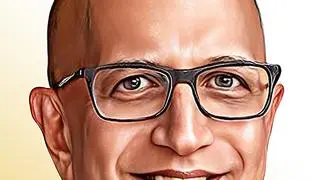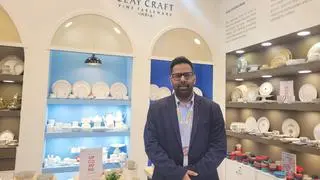As you turn into the drive of V-Guard Industries’ founder Kochouseph Chittilappilly’s home in Kochi, the first thing that catches the eye is a beautiful lotus pond, pink flowers all abloom. Since we are half an hour early for our mid-morning meeting with the 71-year-old philanthropist businessman, who makes constant headlines with his activism and charity, we take a stroll around the lovingly landscaped garden.
But word has reached Chittilappilly about our arrival and he quickly ushers us in, brushing aside our apologies about arriving too early. He is rather amused that we want to meet him to learn about his life and businesses, the first he says is too well documented (he himself has penned an autobiographical book A Journey towards Hope in English and Ormakillivathil in Malayalam). The latter, he says he plays little part in now, having handed over the two listed companies he created — V-Guard and Wonderla Amusement Parks and Resort — to his two sons. Though he does have a new real estate business, Veegaland Developers, in which he takes active interest.
But he humours us by retelling the story of how he started up, diving into his childhood, growing up in a well off propertied family of farmers in a village (Parappur) near Thrissur, and studying in a local Malayalam medium school. “My ambition was to become a scientist — I dreamt of a job in ISRO,” he says, which led him to do his M. Sc. in physics, with electronics. “But I had some learning disabilities which were not identified then, and was an average student,” he says. After post graduation, he took up a job in a small scale unit in Thiruvananthapuram that manufactured voltage stabilisers, among other things. He worked three years there, and had occasion to open up many stabilisers that people would bring for repairs. “Somehow, having opened so many stabilisers, I felt I could design a better product,” he says.
So, at the age of 27, he ambitiously decided to start a company to manufacture voltage stabilisers. He applied to his father for a start-up capital of ₹50,000. “I thought I could get a bank loan of another ₹50,000 ,” he says. But the banks refused, so his father gave him that amount too, but on a pre-condition. That he would marry that year.
Thus, in 1977, Chittilappilly not only became an entrepreneur, but started his married life too in Kochi, with ₹1 lakh and a second-hand Lambretta scooter that he bought for ₹2,800.
Why Kochi? “I didn’t want to start in Thrissur where all my family and friends were — and be under their scrutiny,” he explains. To start off, he hired a couple of "SSLC fail workers" as no diploma holder or engineer was willing to join.
In fact, this has been his hiring philosophy throughout, even when the company became big— to take ordinary people, and turn them into achievers. “Very ordinary people are doing extraordinary things in our company. I was just an above average student and if I could achieve this much, then anybody can,” he says simply. “I value common sense more than technology knowledge,” he adds.
By now, Mary the housekeeper, arrives with tea and cashew nuts — Chittilappily springs up to assist her and serves us himself. Asked about his favourite restaurants and cuisines, he says he is not really a foodie, and so long as the food is tasty, will eat anything.

Empowering rural women
We ask him, how did V-Guard manage to overcome the labour trouble all businesses in Kerala inevitably face?
Chittilappily says, unlike firms like Apollo Tyres, whose entire manufacturing was focussed within a single compound, V-Guard had spread its production all over Kerala. He was perhaps the first businessman in Kerala to go for the outsourced manufacturing model. “We used to read that Japanese companies used to follow a third- party manufacturing model. So I tried this, approaching women’s societies in rural areas in the State to build the voltage stabiliser. The dual advantage was that if you involved women’s societies in rural areas, then central excise exemption was there, and it also empowered rural women.”
There were other advantages too — the infrastructure cost was less, there was no labour “hungama” . Soon, they replicated this manufacturing model in Tamil Nadu and Karnataka too.
But Chittilappilly says though the company expanded sales to several States, the growth was very gradual. The big growth for V-Guard came only after it listed in 2008, when it was 30 years old, even though the IPO came bang in the middle of global economic depression. “There were two reasons for listing. We wanted to raise ₹70 crore for expansion — we could have taken a loan too, but I wanted there to be accountability. Second Gen had joined the company and I believed having shareholders would bring discipline,” he says. Despite the adverse economic climate, Chittilappily says he was confident the issue would be oversubscribed and sure enough it was. “We issued at ₹82, it went down to ₹45, but then it rallied,” he says.
In 2006-07, just before it listed, the revenue was ₹222 crore. In FY 22, V-Guard’s annual turnover is ₹3,498 crore. And the company now expects 60 per cent of its revenue to come from non southern States in a few years time. The voltage stabiliser — which was the foundation of the company’s existence, along with inverters and UPS —now contributes just 23 per cent of its revenue with electrical house-wiring cables and switchgear contributing the bulk (46 per cent). “Very early on, I expanded the portfolio, anticipating the power situation in the country would improve,” discloses Chittilappily.
Elder son Arun is in charge of Wonderla, the ₹128 crore amusement park company — mainly because when he was studying in Bangalore at that time, the firm was setting up a new amusement park in the Garden City, and Chittilappily felt he could oversee it. Younger son Mithun looks after V-Guard.
Chittilappily reveals he created Wonderla because when he took his children to Disneyland, he got very interested in the technology behind the rides and promptly set about studying them. “Behind the curtains, there is very interesting technology in the rides, and I was fascinated. Why couldn’t we set up miniature versions in India, I thought,” he says. Wonderla is now the largest chain of amusement parks in the country — the pandemic has delayed the start of construction of a new park in Chennai, where land has already been acquired, he says.
Meanwhile, Sheila his wife, was at a loose end with both children settled, so she jumped into enterprise too with a garment start up – V-Star Creations, that today has a turnover of ₹142 crore. “She started with ethnic wear but soon pivoted to inner wear,” says Chittilappily.
Related Stories
Crisis and redemption : A fund of lessons
Sanjay Sapre, outgoing president of Franklin Templeton, opens up about the shutdown of six fundsIn 2012, he himself founded a fourth family company — Veegaland Developers, which is clocking a turnover of ₹136 crore. But why get into construction, we ask? Chittilappily reveals apart from being obsessed with technology, he is also endlessly fascinated by construction. Also, he says, he believed there was space for a responsible builder who would adhere to all the rules and regulations and give quality constructions. “We have handed over five projects so far — mainly in central Kerala,” he says.
An interesting thing in real estate in Kerala, he points out, is that the trend of people buying properties as investment has been reversed. Now, more people are buying for their own use.
Ask Chitillappily to pinpoint reasons for the success of his enterprises and he says, “Quality consciousness and straightforward attitude.”
Even though he is hands-off, and as Chairman Emeritus, does not have voting rights, don’t his hands itch to offer suggestions to his sons? He laughs and says he believes in giving space to the next gen. “From the beginning, I used to delegate to the maximum. If somebody is capable of doing the job, I will not nag or interfere,” he says.
Philanthropic initiatives
Instead, he is very focussed on his charities, and activism, standing up against anything that he feels is not fair. “When the profitability of the companies increased, I took a decision that a good amount of wealth would be given to charity — this is from my personal wealth, mind you, not the company CSR, which too happens,” he says.
The philanthropic trust he has set up, which is funded by the 130 lakh shares he has offloaded at different times generating ₹312 crore, is largely focussed on health — something he feels deeply about. In an extraordinary move, he donated a kidney to a stranger to create awareness about it.
His typical day begins with yoga and some exercise on the treadmill and crosstrainer, and he also tries to visit a construction site. "I cannot sit idle, and in my life, there will always be some construction going on somewhere," he says.
It’s time for us to leave and as we step out, Mary the housekeeper rushes to us, bringing a small bucket in which a few lotus seeds are sprouting. “I saw you looking at the lotus — here are the seeds, you can grow them in a bucket at home,” she says, as Chittilappily looks on indulgently.











Comments
Comments have to be in English, and in full sentences. They cannot be abusive or personal. Please abide by our community guidelines for posting your comments.
We have migrated to a new commenting platform. If you are already a registered user of TheHindu Businessline and logged in, you may continue to engage with our articles. If you do not have an account please register and login to post comments. Users can access their older comments by logging into their accounts on Vuukle.